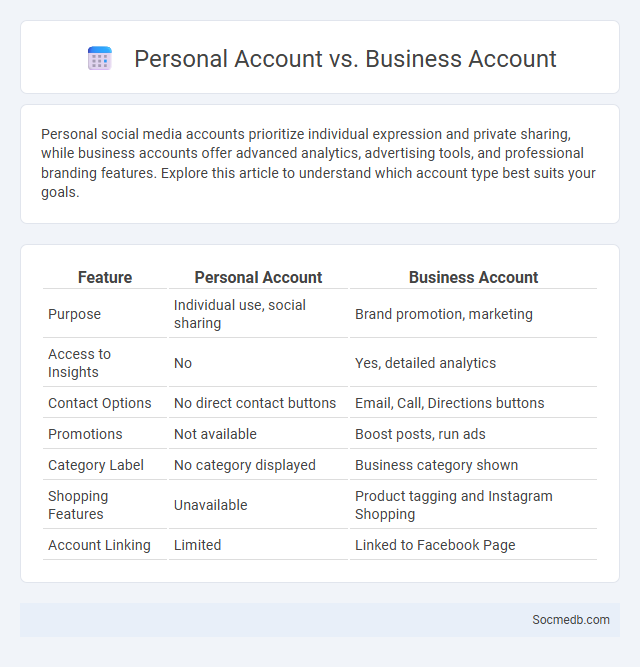
Photo illustration: Personal Account vs Business Account
Personal social media accounts prioritize individual expression and private sharing, while business accounts offer advanced analytics, advertising tools, and professional branding features. Explore this article to understand which account type best suits your goals.
Table of Comparison
| Feature | Personal Account | Business Account |
|---|---|---|
| Purpose | Individual use, social sharing | Brand promotion, marketing |
| Access to Insights | No | Yes, detailed analytics |
| Contact Options | No direct contact buttons | Email, Call, Directions buttons |
| Promotions | Not available | Boost posts, run ads |
| Category Label | No category displayed | Business category shown |
| Shopping Features | Unavailable | Product tagging and Instagram Shopping |
| Account Linking | Limited | Linked to Facebook Page |
Understanding Personal Accounts
Personal social media accounts represent individual identity expression and digital interaction. Optimizing privacy settings on platforms like Facebook, Instagram, and Twitter enhances security and controls information sharing. Regularly updating profile details and content aligns with personal branding and audience engagement strategies.
Key Features of Business Accounts
Business accounts on social media offer advanced analytics to track engagement, follower demographics, and content performance, enabling data-driven marketing strategies. These accounts provide access to advertising tools, allowing targeted promotions based on user behavior, location, and interests to maximize reach and ROI. They also facilitate direct customer interaction through messaging features and call-to-action buttons, enhancing customer service and driving conversion rates.
What Does "Following" Mean?
Following on social media means subscribing to another user's content to receive their updates, posts, and activities in your feed. Your following list represents the accounts you are interested in and allows you to stay connected with their latest information. By following someone, you ensure your social media experience is personalized with content relevant to your interests.
Core Differences: Personal vs Business Accounts
Personal social media accounts prioritize individual expression, featuring content such as photos, life updates, and social interactions, while business accounts focus on brand promotion, customer engagement, and analytics-driven strategies. Business accounts often include tools for advertising, audience targeting, and performance tracking unavailable in personal profiles. Privacy settings also differ, with personal accounts tending toward controlled sharing among friends, whereas business accounts emphasize public visibility and professional networking.
Advantages of Using a Personal Account
Using a personal social media account enhances genuine connections by allowing users to share authentic experiences and build trust within their network. It provides tailored content that aligns with individual interests, improving user engagement and satisfaction. Personal accounts also offer a secure space to express opinions and participate in communities, fostering a sense of belonging and support.
Benefits of Opting for a Business Account
Business accounts on social media provide advanced analytics tools that help companies track audience engagement and optimize marketing strategies effectively. These accounts often offer enhanced advertising options, enabling targeted campaigns that increase brand visibility and customer acquisition. Access to features like scheduling posts and integrating e-commerce solutions further streamlines operations and boosts overall efficiency.
Limitations of Each Account Type
Social media platforms impose specific limitations on each account type, affecting your content reach, interaction capabilities, and access to advanced features. Personal accounts often have restrictions on advertising and analytics, while business accounts may face limits on organic reach and require compliance with strict advertising policies. Creator accounts provide enhanced engagement tools but can be hindered by algorithmic prioritization and content monetization rules.
When to Switch from Personal to Business
Switching from a personal to a business social media account becomes essential when your content consistently promotes products, services, or professional expertise, helping to optimize advertising and analytics features. Businesses that seek to build brand awareness, engage with customers, and access advanced promotional tools benefit significantly from this transition. A business account also offers insights into audience demographics and behavior, enabling data-driven marketing strategies that boost growth and visibility.
The Role of Followers on Social Platforms
Followers on social media platforms serve as key indicators of your account's reach and influence, directly impacting engagement rates and content visibility. High follower counts enhance social proof, encouraging more interactions, brand collaborations, and opportunities for growth. Understanding the behavior and preferences of your followers helps tailor strategies for increased loyalty and sustained audience expansion.
Choosing the Right Account for Your Needs
Selecting the right social media account depends on understanding your specific goals, target audience, and content style. Platforms like Instagram excel for visual storytelling, while LinkedIn caters to professional networking and B2B connections. Evaluating each platform's features, engagement metrics, and demographic trends ensures your social media presence aligns effectively with your needs.
 socmedb.com
socmedb.com